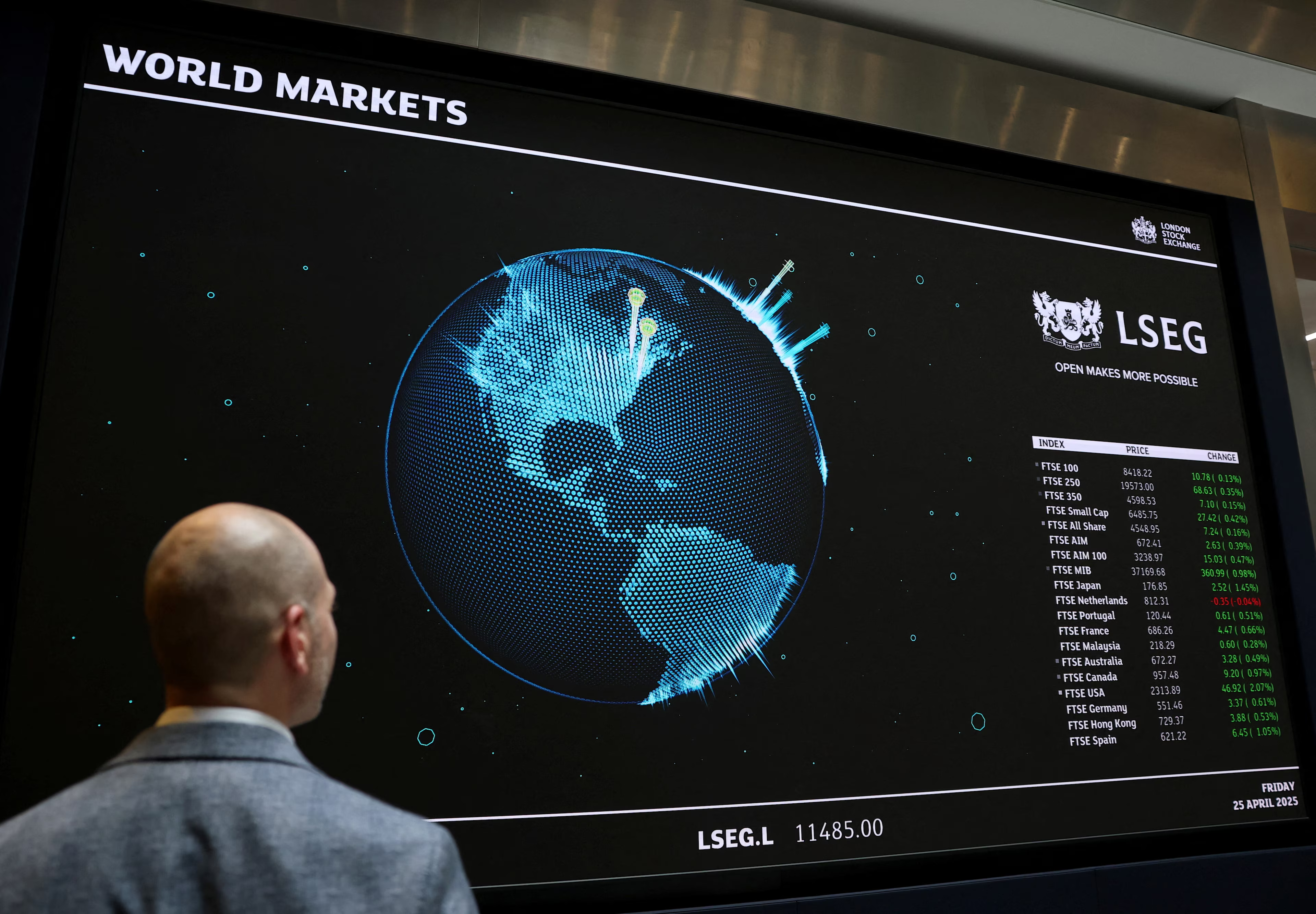Many countries, companies and investors have pivoted towards services amid an uncertain global economic landscape and rise in protectionism.
The rise in protectionism and trade restrictions has largely focused on goods, but is this shift into everything as a service the wisest path forward?
The old economy is needed to fire the new economy in the re-industrial era and companies will have to adapt, particularly when it comes to energy and securing resources to power services-oriented activity.
세계경제포럼, 2025년 5월 23일 게시
Alexis Crow
Partner, Chief Economist, PwC

Amid tariff-induced uncertainty in the global business and economic landscape, many countries, companies and investors have adopted a defensive stance by pivoting toward services.
After all, the record number of trade restrictions in the globe have, to date, been predominantly focused on goods, which remains very much the emotional category of trade – think soy beans and motorcycles; rare earths and handbags.
The sharp rise in protectionism over recent years has not yet fully seeped into services-oriented activity. In fact, according to the World Trade Organization (WTO), global trade in services is booming. Moreover, services exports created 4.1 million jobs in the US in 2022.
Services the driving force behind job creation
In structural terms, even prior to the pandemic, services-related economic activity had been the driving force behind job creation and wage gains, in both advanced and emerging market economies.
Services activity represents the most consumer spending in consumption-driven economies like the US. This includes expenditures related to non-tradeable services such as shelter costs and hospitality, as well as on tradeable services, such as finance. Even within the much-hallowed sector of manufacturing, ever-deepening services intensity means that almost half of the 5.1 million manufacturing jobs in the US are focused on services, such as engineering design jobs.
The corporate pivot towards everything as a service is nothing new. We’ve recently witnessed opportunistic Big Tech companies shift into finance, and how this competition prompted financial services companies to innovate in their tech offerings.
Even in retail, luxury retailers have increasingly turned towards providing curated experiences or retail-tainment as a way of engaging their customer base. In the transport realm, the shift toward electrification also means that automotive production is increasingly geared towards coding and software, rather than solely goods production.
But is this strategy of everything as a service the wisest path forward? Reflecting on recent geopolitical shifts, it remains unclear if rising protectionism will remain strictly relegated to goods. In fact, non-tariff barriers to trade in services, including an array of regulations and digital taxes, may proliferate as retaliation for restrictions on goods.
Service-providing companies could also face a tide of rising brand nationalism in certain geographies, as consumers vote with their feet in response to increasing trade frictions.
Against this backdrop, how can companies and investors effectively respond to the changing business landscape? When the dust settles on tariffs, how can executives successfully meet changing patterns of demand over the long term? Two emerging themes: one economic, and one geo-economic, may provide a hint at what’s to come.
The revenge of the old economy
Firstly, in the turn towards services, it is worth pointing out that we haven’t fully exited the old economy – that is, manufacturing and industrial oriented, resources-producing economic growth. In fact, the blossoming of services activity – such as data centres to support generative AI (GenAI) – requires an enormous amount of energy for power generation, from all kinds of sources.
Plus, much to the chagrin of some climate warriors, the electrification of transport is also energy avaricious. Residential needs are also a major driver of power demand, indicating that even the housing of services-oriented activity requires significant electricity generation going forward.
Have you read?
- Germany’s economic crossroads could lead it to thrive in the ‘re-industrial era’
- ‘King dollar’ dethroned? USD dominance in an age of geo-economic fragmentation
What this means is that tradeable and non-tradeable services activity requires a significant amount of energy addition. New power sources like wind, solar and hydro are likely to be combined with old economy resources like oil, natural gas and nuclear.
Indeed, the fact that a major multilateral development bank is exploring funding nuclear energy projects suggests that all options are on the table for meeting rising demand in emerging market and developing economies alike.
Economic security is national security
The second theme – which is geo-economic in nature – relates to a structural shift set into motion from various recent events, stretching back to early trade tension years (circa 2018); the COVID-19 pandemic and Russia’s invasion of Ukraine.
Arguably, protectionist measures in trade policy set the tone for distinctly nationalistic responses during the pandemic. Commitments to build back better often involved the building up of domestic capacities to respond to global shocks.
The rise of industrial policy began to ricochet across global markets, as governments also sought to use manufacturing activity to stimulate growth. Then, after Russia’s invasion of Ukraine, the scramble for natural resources at times evoked panic-driven policy decisions, with some European countries stridently working to secure energy within their own borders, sometimes at the cost of bilateral relations.
Throughout related energy shocks – and, indeed, even at present – policy-makers in the US, China and other major economies continue to emphasize that national security and economic security are one and the same; and that economic security is often underpinned by stable energy supply. Accordingly, we might say that we live in a re-industrial – rather than a post-industrial – era. The rise of the defence industrial complex within Europe is also a case in point.
Even green industrial policies are captured here: again, the scramble to secure resources to fuel a cleaner, brighter future has also led to a proliferation of policies designed to support the innovation and growth within clean tech and green manufacturing – be it the US Inflation Reduction Act, South Korea’s Green New Deal, the UAE’s Green Agenda or Italy’s green industrial policy.
Indeed, when the economic reality of the need to secure energy supply to fuel services-related growth collides with climate change realities, one can expect that a proliferation of policies designed to bolster energy addition is likely to continue across geographies – even well beyond the present downcycle in environmental, social and governance.
Business in the re-industrial era
Accordingly, in this brave new world of the re-industrial era, companies should adapt to the reality that the old economy still fires that of the new. Production of energy will need to become ever more efficient, and the procurement of energy ever more pragmatic.
In boosting their own energy supply, corporates are securing more purchase power agreements (PPAs) outright, which often entails generating renewables projects in their own manufacturing and distribution plants.
Recent moves by hyperscalers to secure PPAs to power their data centres are also likely to signal to other services-oriented companies, such as banks, to do the same.
In this blending of old and new economy, human capital can come from anywhere. Energy companies continue to move jobs offshore, deepening a complex – and often cross-border – web of services supporting energy production, which, in the end, supports services-oriented activity in multiple jurisdictions and sectors.
Companies must be flexible in their response to changing patterns of demand and also nimble in garnering top brass talent and R&D from across different geographies.
Although this inherently cross-border activity flies in the face of the recent contractions of protectionism, it is worth pointing out that even the most staunchly nationalistic calls for supporting domestic economic security entail a plea for cross-border physical, financial and human capital.
The distinctly local origins of policies shaping the re-industrial era still require global solutions, and this geo-economic reality might provide a salve amid ructions in other fora.


